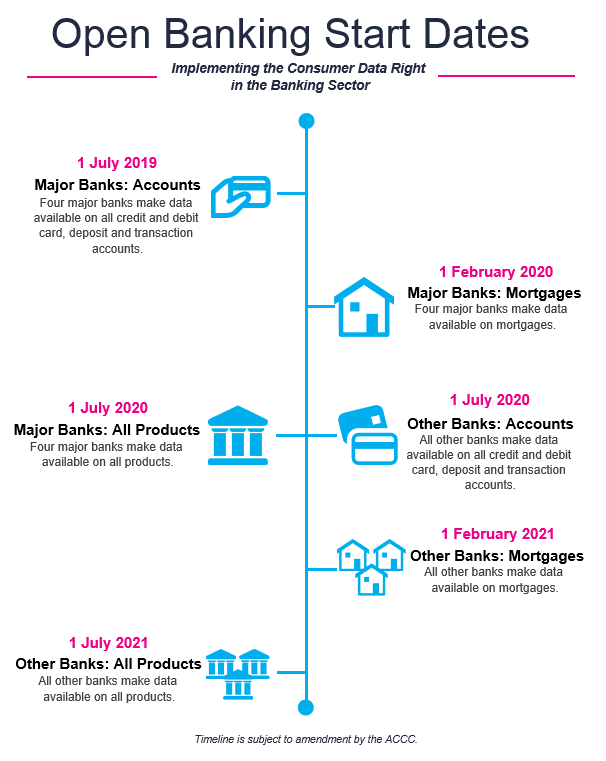This article was written by Scott Farrell.
A new playing field for customers and businesses has been set, with the Australian Government announcing that it will implement the recommendations of the Open Banking Review.
The significance of this announcement should not be underestimated and now is the time for businesses to understand and engage with this fundamental development, as a customer or a service provider (or both).
This is not restricted to the banking sector. Treasury and the ACCC are already considering its expansion to the energy and telecommunications sectors, and other sectors of the Australian economy should also take the time to understand what this means for them.
Phased in from 1 July 2019, Open Banking has the potential to transform the competitive landscape of financial services, and give customers more control over their information, leading to more choice and ultimately more confidence in the use and value of an asset mostly undiscovered by customers – their data.
Links to the Australian Treasurer's announcement can be found here, and the Treasury's Consumer Data Right page can be found here.
What is this all about?
Open Banking gives customers a right to direct that information which they already share with their bank, be shared with others they trust. It is designed to put customers in control of their information, leading to more choice in their banking and more convenience in managing their money, and resulting in more confidence in the use of their data, and their access to the value of an important asset.
It is the first part of the Consumer Data Right and Open Banking is now the name given to the Consumer Data Right when it is applied to the banking sector. This means that the Open Banking recommendations should be seen as a guide as to how the Consumer Data Right is to be implemented in other sectors. For example, a similar customer-driven approach should apply.
There are a number of complex and challenging issues in implementing Open Banking and the Consumer Data Right. The recommendations of the Review into Open Banking set out how this can (and, with the Government's announcement, will) be done in Australia. Despite this complexity, the Review recommended that four simple principles be applied in implementing Open Banking, and the Government has now adopted these for the implementation of the Consumer Data Right more broadly:
- the Consumer Data Right should be consumer focussed.
- the Consumer Data Right should encourage competition.
- the Consumer Data Right should create opportunities.
- the Consumer Data Right should be efficient and fair.
These principles provide a useful guide in navigating the detail of Open Banking and the Consumer Data Right. More detail on how can be found in our summary of the Open Banking Review here.
When is this going to happen?
Open Banking is to have a phased implementation, commencing with the largest four Australian banks, and then extending out into the other Australian banks. The implementation is to be conducted by reference to product types, as well as size of institution as summarised in the following diagram.

Implementation of the Consumer Data Right in the energy and telecommunications sector will follow further consideration of, and consultation on, the appropriate sets of data which should be covered.
Why should I care?
Banks, energy companies and telecommunications companies in Australia will need to respond to the new rights being given to their customers - and the customers of their competitors - as the Consumer Data Right commences. It should present an opportunity for these entities, and new competitors, to develop new competitive offerings to share the value of customers' data with those customers.
Firms outside of these sectors should also start to engage with the Consumer Data Right, either because they are customers themselves, or because the Consumer Data Right is intended to be extended to other sectors of the Australian economy, including their own.
Beyond this, there is a more strategic aspect for businesses. The implementation of the Consumer Data Right provides a concrete opportunity for customer-driven businesses to engage with the developing data economy and an essential resource which can drive productivity, competition, efficiency and innovation - data.
The decision to implement Open Banking is the culmination of a significant amount of work from the banking, fintech, consumer, regulatory and government communities. It will be important that the members of these communities, and the others needing to participate in the new data economy, engage in ensuring that Open Banking and the Consumer Data Right produces the customer choice, convenience and confidence it is designed to have.
Where can I find out more?
Our summary of the findings of the Open Banking Review, which also extend to the Consumer Data Right, can be found here. The Australian Treasury has further information on the Consumer Data Right here.
If you would like further advice on how Australia's new Consumer Data Right might affect your business, and what you should be doing now, the King & Wood Mallesons Digital Economy team is also happy to help.
Disclosure: the author of this article led the Open Banking Review for the Australian Government.
- Banking & Finance
- Banking & Financial Markets Regulation
- Banks
- Biotechnology
- Competition & Antitrust
- Construction
- Electricity, Renewables and Energy Transition
- Energy, Resources & Infrastructure
- Energy, Resources & Infrastructure
- Financial Services
- Fintech
- Future Energy
- Telecommunications
- Telecommunications, Media, Entertainment & Technology









